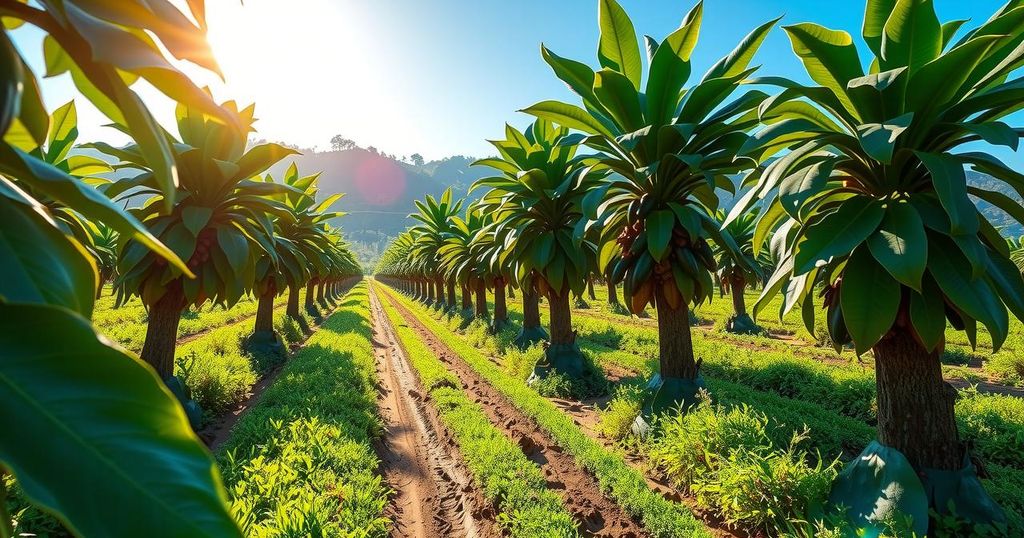Cocoa Prices Soar Amid Production Challenges and Climate Change
Chocolate prices are on the rise due to significant cocoa production challenges, primarily caused by climate change. Reports indicate that cocoa prices reached record highs before dropping. Farmers are facing difficult decisions, with some abandoning cocoa for gold mining. Meanwhile, manufacturers are exploring various innovative approaches and alternatives to adapt to the ongoing crisis in the cocoa market.
The recent surge in chocolate prices is not an illusion; it is a stark reality. Years of shortfalls in cocoa production have led to rising costs, pushing farmers and companies to adopt inventive strategies in this unpredictable market. A multitude of factors, including climate change, has significantly affected cocoa production in the major producing countries, primarily located in West Africa. This region is home to the largest three cocoa producers, who have faced erratic weather patterns, shifting from excessive rainfall in 2023 to extreme drought and high temperatures in 2024, as reported by Al Jazeera.
Cocoa prices experienced a dramatic spike, nearly tripling to a record high of US$12,931 per metric ton in December 2024 before experiencing a notable decline of about 37 percent, settling around US$8,200. According to the International Cocoa Organization, a global surplus of cocoa, estimated at 142,000 metric tonnes for 2024-2025, is predicted for the first time in four years, potentially easing some price pressure. However, challenges loom on the horizon; analysts warn that the same dry conditions impacting last year’s crop may affect the upcoming harvest as well, especially with ageing cacao trees and various diseases plaguing the industry, mainly in Ivory Coast and Ghana, which contribute about 60 percent of worldwide cocoa supply.
Farmers in regions traditionally known for cocoa production are faced with tough choices. Some in Ghana have abandoned cocoa farming altogether, opting instead to sell their land to illegal gold mining operations, driven by the recent rise in gold prices. Most cocoa farmers in Ghana and Ivory Coast earn very little, barely meeting their basic needs, which hinders their ability to make necessary investments to adapt to climate challenges or rejuvenate their declining plantations.
On the other side, cocoa growers in Brazil are taking a significantly different path, with hopes that it may yield promising results. Better access to funding and resources has led to the creation of expansive, full-sun cocoa farms that could transform the cocoa landscape, should they prove viable. Yet, as cautionary words from a government scientist suggest, the heavy reliance on cloned plants for large-scale farming could intensify the vulnerability of cocoa trees to disease outbreaks.
The responses from manufacturers in light of the ongoing cocoa crises have been varied, ranging from reducing product sizes to exploring cocoa-free alternatives. For instance, Cargill has teamed up with Voyage Foods, a company based in the U.S., to develop chocolate bars devoid of cocoa, crafted from grape seeds, sunflower flour, and other flavorings. Furthermore, startups such as Nukoko and Planet A are delving into innovative methods to replicate chocolate’s aromas and flavors, while businesses like Fix Dessert Chocolatier are offering unique products like Dubai chocolate, which merges pistachio, tahini, and influences from the traditional Middle Eastern dessert kunafa. Not to be outdone, established chocolate brands like Mars have opted to simply pass on the higher costs to consumers by shrinking product sizes—but still maintaining those prices.
In summary, chocolate prices have surged due to a confluence of production challenges, largely stemming from climate change and unsustainable farming practices. Farmers face dire choices, many abandoning cocoa for more profitable ventures. While Brazil’s innovative approaches may offer hope, the industry remains fraught with issues. Manufacturers are responding with creativity, from cocoa-free alternatives to adjusting product sizes, as they navigate these turbulent times. The outlook for cocoa remains cautiously optimistic, yet uncertain, with the understanding that consumers will likely continue to feel the impact on chocolate prices.
Original Source: macaonews.org




Post Comment